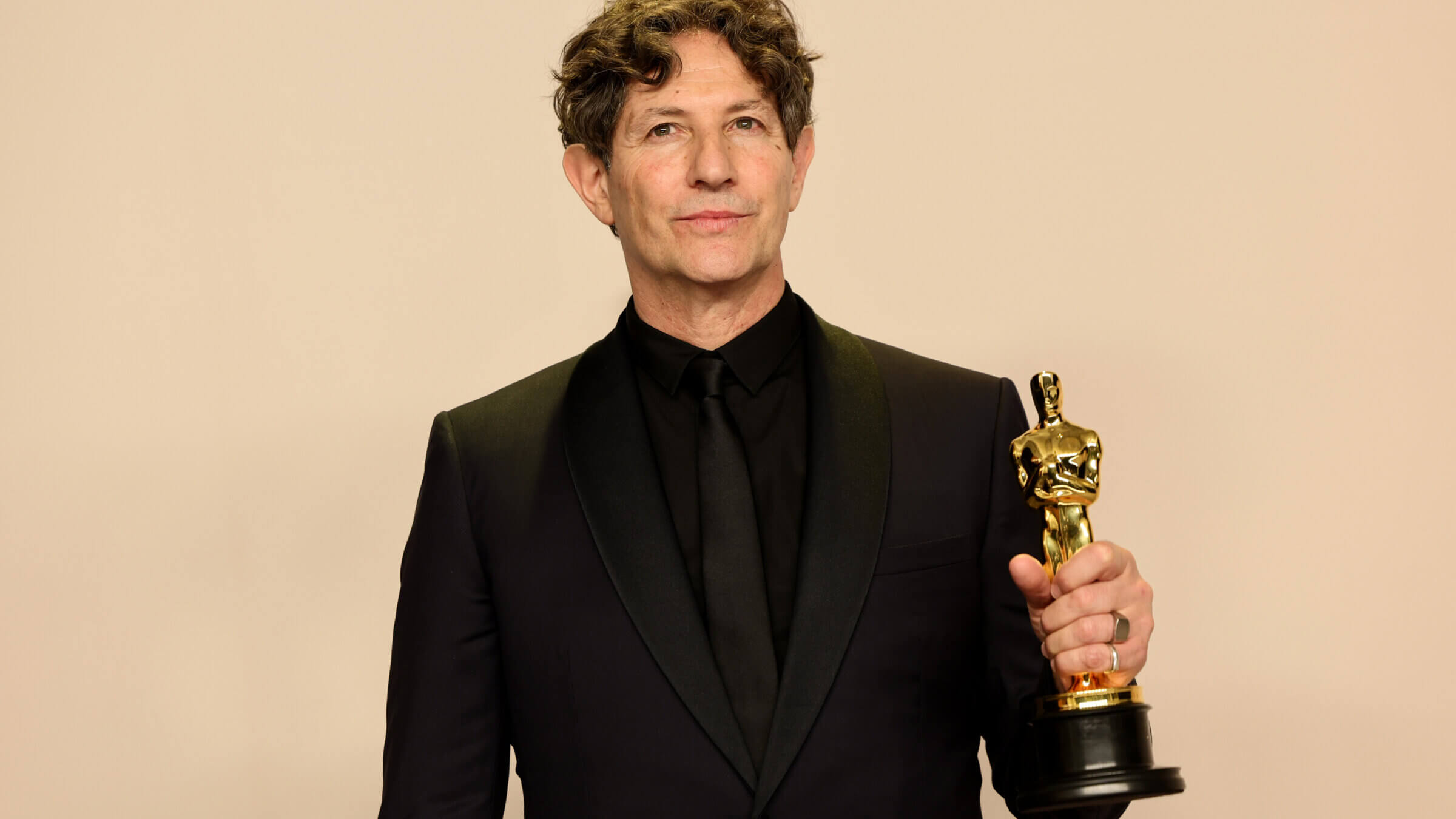At Oscars, ‘Zone of Interest’ director calls out ‘Jewishness and the Holocaust being hijacked’ by Israel
Stars wear ceasefire pins; film about Mariupol massacre wins Best Documentary

Jonathan Glazer with his Oscar Photo by Arturo Holmes/Getty Images
Director Jonathan Glazer denounced Israel’s prosecution of the war against Hamas in his acceptance speech for Best International Feature at the Academy Awards on Sunday night, linking what he called the dehumanization of the conflict to the Holocaust setting of his film The Zone of Interest.
The drama, which tracks the daily lives of the overseer of Auschwitz and his family, Glazer said, was “made to reflect and confront us in the present — not to say, ‘Look what they did then,’ rather, ‘Look what we do now.’”
Jonathan Glazer’s acceptance speech for Best International Film for ‘THE ZONE OF INTEREST’ at the #Oscars pic.twitter.com/XNsMv0HDib
— Film Updates (@FilmUpdates) March 11, 2024
“Our film shows where dehumanization leads at its worst. It shaped all of our past and present,” he said, adding that he and his collaborators “refute their Jewishness and the Holocaust being hijacked by an occupation which has led to conflict for so many innocent people. Whether the victims of October the 7th in Israel or the ongoing attack on Gaza, all the victims of this dehumanization, how do we resist?”
Glazer wore glasses to read from a paper and appeared nervous. The audience responded with applause, and Zone of Interest‘s lead actress, Sandra Hüller, watched him in tears.
A number of stars wore red lapel pins from the group “Artists4Ceasefire” during Sunday’s ceremony, including Mahershala Ali, Mark Ruffalo, Billie Eilish and her brother Finneas O’Connell and Ramy Youssef, who explained the button in a red carpet interview.
“We’re calling for peace and justice – lasting justice – for the people of Palestine,” Youssef, star of the hit show Ramy and a supporting actor in Poor Things, told Variety. “And I think it’s a universal message of just: Let’s stop killing kids. Let’s not be part of more war.”
Later in the evening, Mstyslav Chernov, the Ukrainian journalist whose 20 Days in Mariupol took the Oscar for Best Documentary, spoke similarly about the tragedy that unfolded there.
“I will probably be the first director on this stage to say that I wish I had never made this film,” Chernov said. “I wish to be able to exchange this for Russia never attacking Ukraine, never invading our cities. I wish to be able to exchange this for Russian not killing 10,000 of my fellow Ukrainians.”
Glazer’s speech marks the highest profile invocation of the Israel-Hamas war — and the first to be explicitly rooted in Jewish identity — during this awards season. It was notable, too, for also calling out dehumanization directed at the victims of Oct. 7.
At the Grammy Awards, Annie Lennox called for a ceasefire after her tribute to Sinead O’Connor.
In previous awards shows, in Glazer’s native Great Britain, members of The Zone of Interest team brought up current events. At the BAFTAs — the British Oscars — producer James Wilson said the film was a reminder that “we should care about innocent people being killed in Gaza or Yemen in the same way we think about innocent people being killed in Mariupol or in Israel.” Composer Mica Levi, accepting their award from the London Critics Circle last month called for a ceasefire and “for some change.”
Numerous articles about The Zone of Interest, notably one by David Klion last week in The New York Times, saw in the film a parable for the suffering Gaza and the numbness onlookers might feel in the face of it.
Glazer dedicated his win to a woman named Alexandria who he met while researching the film. An unnamed character in the film, a Polish girl who as a form of resistance planted fruit for prisoners in the trenches outside Auschwitz, was based on Alexandria, who told Glazer she had done just that when she was 12.
But his comments about the Gaza war drew immediate criticism online from Jewish leaders.














